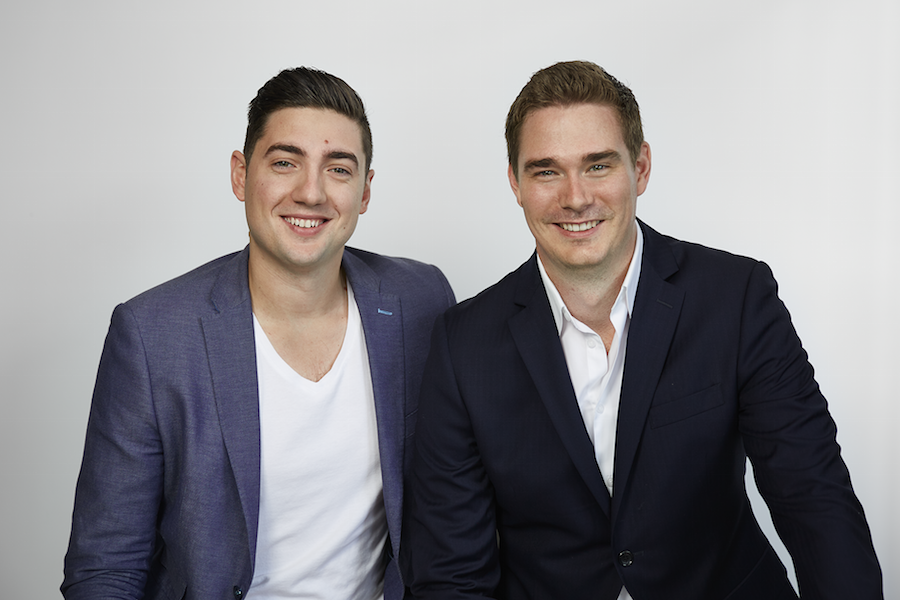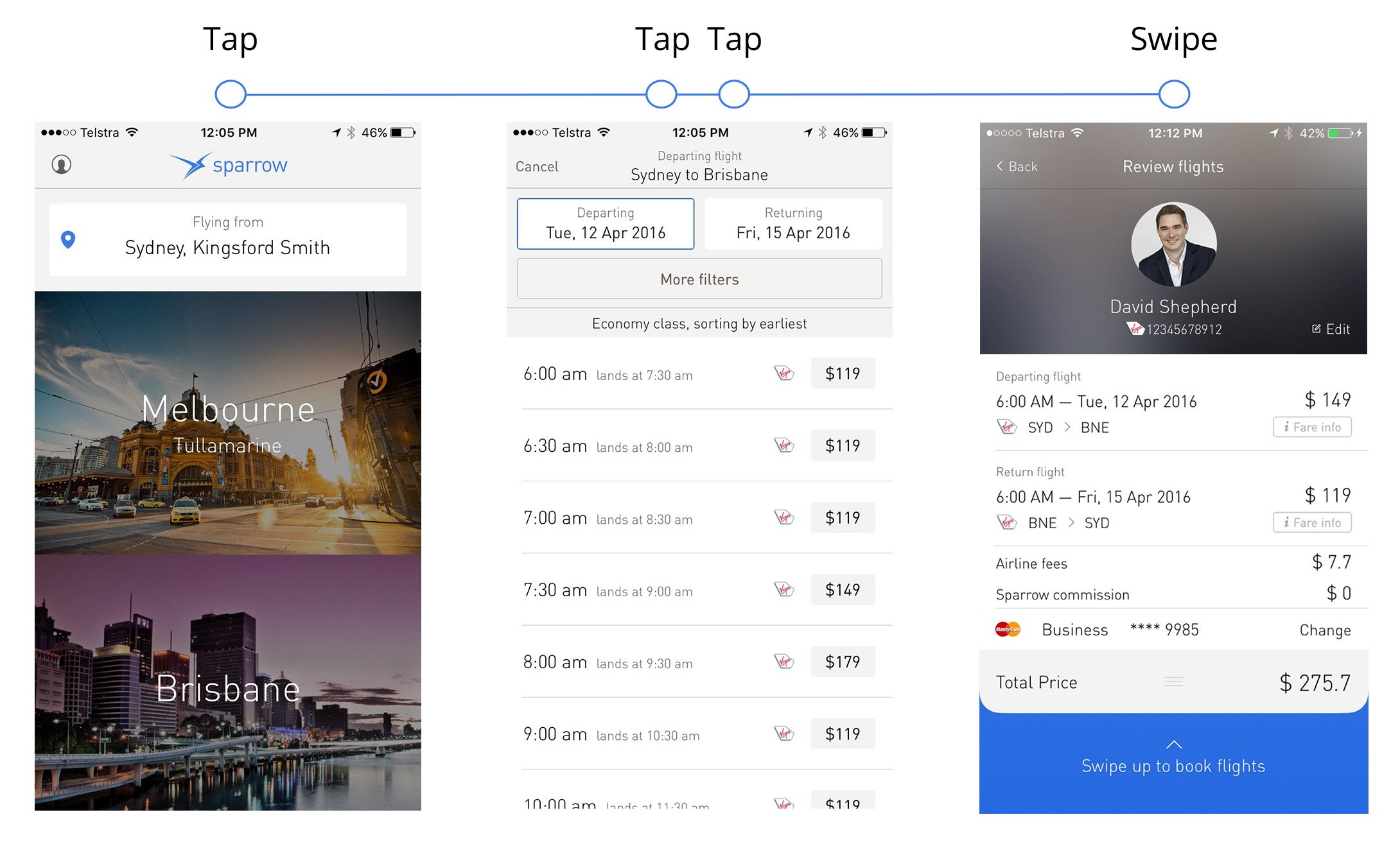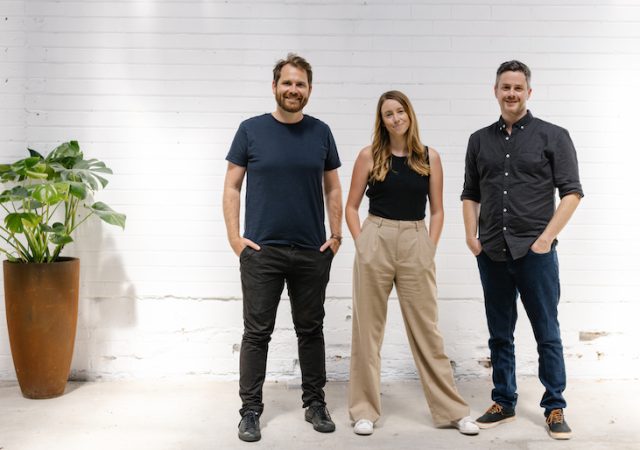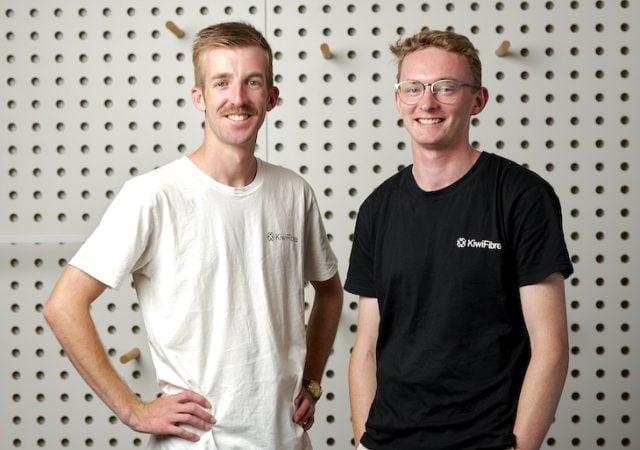For even the most diligent or excited of travellers, booking flights is a pain. Whether you’re an avid SkyScanner junkie or know all the tricks around each airline’s website and how to get the best deal, the process is usually slow.
Australian startup Sparrow Flights aims to speed this process up to just 20 seconds by allowing users to book flights in just three taps and a swipe, with no booking or credit card fees to boot. The app also allows users to easily book the same flight as their colleague or travel buddy via a feature similar to that of Uber’s fare split.
Cofounder David Shepherd explained, “We noticed that a lot of flight booking sites and apps are focused on being the cheapest, while neglecting the customer experience through clunky and hard to navigate interfaces. What’s more, consumers using these platforms often invest a lot of time and effort researching the best price, only to get to the end and be surprised by a hefty booking fee.”
The beginnings of the app came from cofounder Adrian Ciaschetti, who had been working on the user flow before meeting up with Shepherd mid-2015 and showing him his work so far. With Shepherd having exited his previous business, marketing agency Digital Massive, in August, he was keen to bring the app to life to solve a problem he had faced many times before.
“Just before Christmas each year, a good friend – and early investor – holds a party in Melbourne. A number of friends make the annual pilgrimage from Sydney. As you can imagine, it’s always a bit of a nightmare getting on the same flight. Sharing the flight number and itinerary via email, a number of Facebook messages, 10 Google Chrome tabs and a frustrating hour later, we are on the same flight,” he said.
Upon sign up, the app detects a user’s location and then displays a list of destinations, in order of popularity. To book a flight, a user needs to tap their desired destination, tap their desired departure time, tap their returning flight, and then swipe to confirm the flight. It works by connecting directly to a global distribution system called Sabre, a reservation system that airlines and travel agents use to control pricing and booking functionality.
Like other apps learning from user behaviour, Sparrow will begin to tailor the experience to each user’s travel habits after a few bookings, remembering previous destinations, dates, times, and any filters used, such as seating class or airline. Sparrow also removes booking fees and absorbs credit card fees; revenue comes from small commissions from airlines, while other potential commissions will be explored as the service grows.
Shepherd said integrating with Sabre presented significant challenges in the build process, with the system built on legacy technology that requires extensive knowledge of the travel industry. The cofounders were helped along by an investor who has experience in the airline IT software space.
“While navigating the new platform, we accidentally booked a $1500 business ticket to Melbourne; Adrian had to quickly run home to cancel the flight and refund the money – we’re glad we fixed that one,” Shepherd said.
The startup has raised just under $120,000 in seed funding thus far, with Shepherd and Ciaschetti putting in money alongside a handful of investors.
Currently in beta, Sparrow will be targeting small to medium enterprises and leisure travellers. Shepherd believes busy SMEs will like the speedy booking process, while leisure travellers will be enticed by the lack of booking or credit card fees and ability to easily book flights with friends.
“Skyscanner, Hopper, and Kayak are great for finding cheap flights but when it comes to making an actual purchase, some apps will forcefully redirect to another booking site, where they will need to fill out all their details all over again. Our ability to control the whole user journey is what sets us apart. Sparrow targets those who are more destination and time focused by creating a supremely simple and personalised travel experience,” Shepherd said.
Despite the popularity of the aforementioned platforms, Shepherd believes the greatest competition Sparrow will face is simply user behaviour. He believes that, since no booking apps have really made it big, consumers are used to researching flights on their phone and then booking on a desktop device.
It isn’t hard to see business owners, particularly other startup founders, getting on board, given they are often early adopters of new technologies and travel often, making the app’s learning of user behaviour handy; however it will likely take longer to convince money-conscious leisure travellers to forgo the lengthy research process they usually undertake and trust in an app that speeds the process up to four actions on their smartphone, particularly if they don’t travel that often.
Sparrow’s beta will be running for three to six months, with Shepherd and Ciaschetti keen to perfect the service before looking for further investment. Given international flights are harder to schedule, requiring things like visas or connecting flight, Shepherd said the startup may look to expand into other domestic markets before looking at integrating international flights.
Image: Adrian Ciaschetti and David Shepherd. Source: Supplied.





















Trending
Daily startup news and insights, delivered to your inbox.